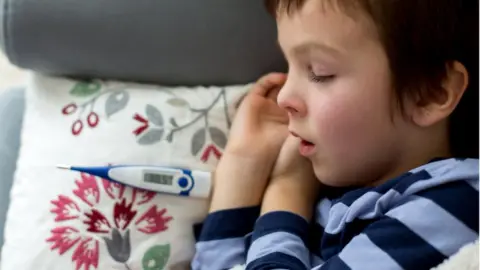A&Es 'overwhelmed' by children with mild winter viruses, doctors warn
 Getty Images
Getty ImagesEmergency departments across the UK are seeing record numbers of young children - but most have a mild fever that could be treated at home, the Royal College of Paediatrics and Child Health says.
Winter viruses are flourishing as more people mix, and a doctor's chief says many A&Es are being "overwhelmed".
Experts say any infections are unlikely to be serious and GPs, pharmacies or NHS 111 should be the first option.
But A&E remains an option if parents are still concerned or in an emergency.
Always seek medical advice if your baby or child:
- is under three months old and has a temperature of 38C (100F) or higher
- is three to six months old and has a temperature of 39C (102F) or higher
- has a fever lasting for more than five days, or is becoming more unwell
- is not drinking well or is dehydrated with fewer than two wet nappies a day
- develops a red rash that doesn't fade when a glass is rolled over it
- has a fit or convulsion
- is crying constantly, or it doesn't sound like their normal cry
The warning from doctors comes after the RCPCH collated data and the views of paediatricians in emergency departments across the UK.
It found children coming to A&E are mostly under the age of five - but they do not have coronavirus.
In most cases, their fevers, coughs and runny noses are caused by other respiratory infections such as RSV, bronchiolitis, the common cold and paraflu.
After disappearing last winter during lockdown when no-one was mixing in large numbers, these viruses have reappeared in the summer - but at winter levels, putting huge pressure on emergency departments in hospitals.
For most youngsters, treatment with children's paracetamol or ibuprofen will make them feel better after a few days.
'At capacity in summer'
Dr Damian Roland, a paediatrician who works in Leicester, said he had recently seen nearly 300 patients in one day in his emergency department.
"You just see hour after hour more and more patients arrive, and we simply don't have enough staff to keep up with that demand," he said.
"We feel like we're at our capacity and winter hasn't even begun yet."
Doctors understand that parents may be concerned, especially if their child is young and this is the first time they have been unwell.
But they are also warning of long delays of more than four hours in emergency departments, which can be difficult for both parents and children.
Dr Camilla Kingdon, president of the RCPCH, said many emergency departments were "overwhelmed".
She said fevers were very common in young children and usually aren't serious.
"Most of these children are fine and have returned home once their parents were reassured," Dr Kingdon said.
"We need to make sure that services are available for children who are seriously unwell."
'Difficult time'
Data from four children's emergency departments - Leicester Royal Infirmary, Royal Hospital for Children Glasgow, Birmingham's Children's Hospital and Alder Hey Children's NHS Foundation Trust in Liverpool - show there were an extra 2,500 children attending in May.
Attendances in children under 15 have increased from nearly 16,000 in May 2018 to 21,046 in May 2019 and 23,661 in May 2021.
Last month, fewer than 1% of attendances were classified as needing immediate attention.
More than 72% - or 17,000 of the children attending - were not seriously unwell.
GPs said delivering care to young children was an essential part of their job, although they were also under huge pressure at the moment.
"We understand that it's a really difficult time to be a parent of a young child, particularly if the child has been born during the pandemic, as many of the usual support services parents rely on have not been available," Prof Martin Marshall, chair of the Royal College of GPs said.
